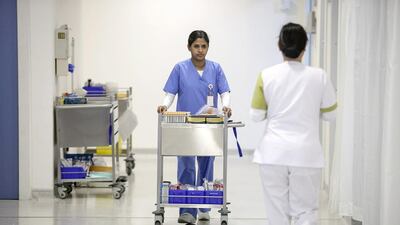ABU DHABI // There is still a severe shortfall in specialist healthcare workers despite an overall growth in the numbers of doctors and medical staff last year.
While strides have been made to plug gaps in all but one of the 35 medical specialities across the emirate, there is still a desperate need for more physicians, especially those in critical, psychiatric and neonatal care, according to recently released statistics by the Health Authority – Abu Dhabi (Haad).
Dr Lalu Chacko, medical director of LLH Hospital – Abu Dhabi, said a shortage of oncology units and specialists was a problem.
Cancer caused 12.9 per cent of all deaths in the emirate last year, with lymphoid, hematopoietic and related tissue cancers the most prevalent.
“We really have only one facility in Abu Dhabi – Tawam Hospital – that has the whole range of services for oncology,” said Dr Chacko.
Mental health services were often understaffed and not deemed a priority, he added.
“Psychiatry is one area where not much importance is given,” Dr Chacko said. “Most hospitals do not have proper psychiatric care.”
Paediatric surgery was another shortfall, he said.
“Many paediatric patients leave the country for treatment because there is a gap in paediatric surgery specialists.”
The Haad report shows critical gaps still exist in intensive and critical care medicine, emergency care, neonatology, paediatrics, oncology, orthopaedics, rehabilitation and psychiatry, while sub-speciality gaps also exist in paediatric surgery.
Neurosurgery and surgical oncology specialists were also in short supply, the health organisation said. The annual report analysed healthcare capacity gaps by location.
It found problems in 12 of 57 locations in Abu Dhabi, Al Ain and the Western Region – most critically in more remote locations such as Ghantoot and Liwa, which suffered a shortage in many specialities.
“Abu Dhabi is a big region. When you leave the city there is definitely a gap in all specialities in all services,” Dr Chacko said.
Limited local services was the second-biggest reason patients were sent overseas for treatment last year, after follow-up care.
Haad said it had taken significant steps to boost the numbers of specialists hired last year.
“During 2013, there has been a marked reduction of existing service gaps,” the report said.
“There has been a 20 per cent growth in the number of emergency physicians, 41 per cent growth in neonatologists, and a 21 per cent increase in paediatric and orthopaedic doctors, respectively.
“Critical doctors have grown by 14 per cent. Obstetrics and gynaecology doctors have grown by 30 per cent.”
Overall, there was a 22 per cent growth in the number of licensed physicians and dentists, according to the report.
The number of facilities offering health care had also grown, by 11 per cent to 1,626.
The Health Statistics 2013 report said private hospitals and clinics were mainly responsible for closing the gaps.
There were now 6,864 physicians, 1,220 dentists, 14,235 nurses, 5,332 allied health professionals and 2,396 pharmacists across the emirate.
But Haad estimated 4,800 additional doctors and 13,000 nurses were needed by 2020.
The licensed facilities include 41 hospitals, 922 centres and clinics, and 503 pharmacies.
jbell@thenational.ae

